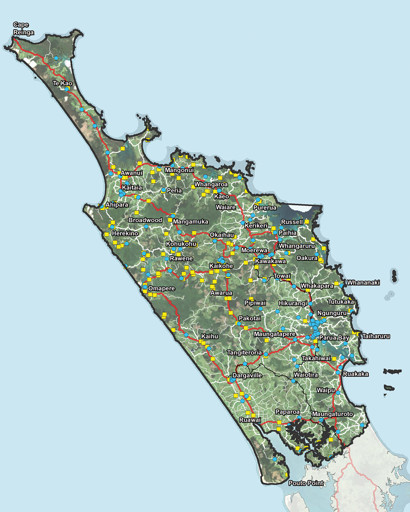Māori constituency poll
This year, there’s an important poll on Māori constituency seats that everyone can participate in. Northland Regional Council has had a Māori constituency since the 2022 elections, but is now required to hold a poll on the future of this constituency.
This means that when you vote in the local government elections, you’ll also be asked to vote on whether to keep or remove the Northland Regional Council Māori constituency, Te Raki Māori.
Māori constituencies are specific electoral areas designed to provide for Māori representation on regional councils in New Zealand.
These constituencies are like Māori electorates in the national parliament and are intended to provide specific democratic representation for Māori.
Only people on the Māori electoral roll can vote for candidates standing in the Māori constituencies. Māori constituencies exist alongside general constituencies, covering the same geographic areas.
People on the Māori electoral roll cannot vote for the general constituencies, and people on the general electoral roll cannot vote for people on the Māori constituencies.
The poll gives our communities the opportunity to vote on whether to keep or remove the Northland Regional Council Māori constituency. The outcome of this poll will apply for the 2028 and 2031 local elections.
The legislation has been amended to provide for the community to make the decision on whether it wants to retain Māori constituencies. Polls at the 2025 local elections are a compulsory step for councils like Northland Regional Council, that established Māori constituencies after 2020 without holding a poll.
Below is a timeline showing key milestones in the establishment of Māori constituencies in Northland:
- 2001: the Local Electoral Act allows councils to establish Māori constituencies subject to a condition that five per cent of the enrolled population can demand a poll to be held to determine the status of the Māori constituencies (‘poll provision’)
- October 2020: Northland Regional Council votes to establish Māori constituencies for the next local government elections.
- February 2021: The Government removes the ‘poll provision’ from electoral legislation.
- Late 2021: Northland Regional Council carries out a representation review, informed by public consultation. This results in the establishment of a Māori constituency (Te Raki Māori) with two councillor representatives for the 2022 regional council elections.
- October 2022: Māori constituency councillors were elected to Northland Regional Council for the first time.
- July 2024: The Government reinstates the requirement for councils to hold a poll before establishing Māori constituencies. This legislative change means that councils with existing Māori constituencies, like Northland Regional Council, must decide whether to disestablish these constituencies, or have the voters decide whether to retain or remove them in conjunction with the 2025 local elections.
- August 2024: Northland Regional Council votes to retain the Māori constituency. This means it must hold a binding poll on whether to retain the Māori wards in conjunction with the 2025 local election.
The poll will be held at the same time as the 2025 local government elections. Along with voting for who represents them on council, people will be voting for the future of Māori constituency seats on council, with postal voting taking place from 9 September to 11 October 2025.
Everyone who is enrolled to vote – Māori or non-Māori - can participate in the poll. You can enrol to vote, or check and update your details, on the Electoral Commission website: www.vote.nz/enrolling
Voters will choose between:
- ‘I vote to keep the Māori constituency’
- ‘I vote to remove the Māori constituency’
The outcome of the poll will be determined by a simple majority vote.
No. Māori constituency councillors sign the same oath as other councillors; at the decision table they will represent and make decisions for the good of all Northlanders, not just Māori.

